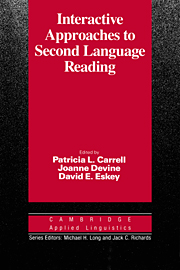Book contents
- Frontmatter
- Contents
- List of contributors
- Series editors' preface
- Preface
- Introduction: Interactive approaches to second language reading
- I INTERACTIVE MODELS OF READING
- II INTERACTIVE APPROACHES TO SECOND LANGUAGE READING – THEORY
- III INTERACTIVE APPROACHES TO SECOND LANGUAGE READING – EMPIRICAL STUDIES
- Chapter 9 A case study of two readers: models of reading and reading performance
- Chapter 10 Changes in cohesion in the recall of native and foreign texts
- Chapter 11 Reading English for specialized purposes: discourse analysis and the use of student informants
- Chapter 12 This test is unfair: I'm not an economist
- Chapter 13 The effects of induced schemata on the “short circuit” in L2 reading: non-decoding factors in L2 reading performance
- Chapter 14 The Miscue-ESL Project
- IV IMPLICATIONS AND APPLICATIONS OF INTERACTIVE APPROACHES TO SECOND LANGUAGE READING – PEDAGOGY
- Index
Chapter 12 - This test is unfair: I'm not an economist
Published online by Cambridge University Press: 05 October 2012
- Frontmatter
- Contents
- List of contributors
- Series editors' preface
- Preface
- Introduction: Interactive approaches to second language reading
- I INTERACTIVE MODELS OF READING
- II INTERACTIVE APPROACHES TO SECOND LANGUAGE READING – THEORY
- III INTERACTIVE APPROACHES TO SECOND LANGUAGE READING – EMPIRICAL STUDIES
- Chapter 9 A case study of two readers: models of reading and reading performance
- Chapter 10 Changes in cohesion in the recall of native and foreign texts
- Chapter 11 Reading English for specialized purposes: discourse analysis and the use of student informants
- Chapter 12 This test is unfair: I'm not an economist
- Chapter 13 The effects of induced schemata on the “short circuit” in L2 reading: non-decoding factors in L2 reading performance
- Chapter 14 The Miscue-ESL Project
- IV IMPLICATIONS AND APPLICATIONS OF INTERACTIVE APPROACHES TO SECOND LANGUAGE READING – PEDAGOGY
- Index
Summary
The studies reported in this chapter were designed to test the hypothesis that an English foreign language (EFL) student's background discipline – that is, his knowledge of a particular academic field – would affect his performance on tests of reading comprehension. In other words, we hypothesized that a student of, for example, engineering, would perform better on an engineering text than would a student of economics, even though the general level of EFL proficiency of the two students was equivalent.
In what might be considered the traditional position towards the selection of texts for testing purposes, the aim is to select texts which are sufficiently “general” so as to avoid favouring any particular group of students. It can be seen that underlying this position is a belief that certain texts will favour particular groups, presumably because of the background knowledge available to these groups. To this extent, the traditional position is in line with the hypothesis being investigated here. Where we differ is in our view of the possibility and desirability of using general texts.
The traditional view depends crucially on the following assumptions:
that it is possible to find truly “general” texts, that is, texts which are so neutral in content and cultural assumptions that they will not in any significant way favour any particular group.
that in English for Academic Purposes (EAP), at least, performance on such texts can be used as predictive of students' performance on texts in their academic field; that, for example, the performance of a would-be post-graduate student of dentistry on a text about piracy in the seventeenth-century Caribbean can be used to predict his or her ability to read research material in dentistry. […]
- Type
- Chapter
- Information
- Interactive Approaches to Second Language Reading , pp. 168 - 182Publisher: Cambridge University PressPrint publication year: 1988
- 20
- Cited by

